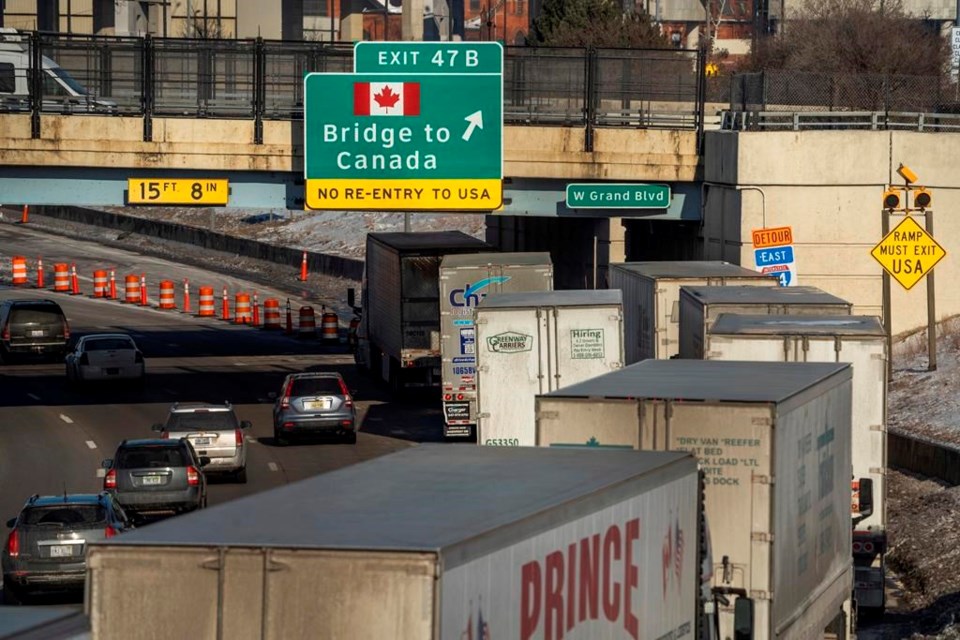A protest against COVID-19 measures prevented Canada-bound traffic from crossing a busy international bridge for yet another day as police in Windsor, Ont., looked to diplomacy to solve the problem.
Dozens of cars and trucks have set up on the Canadian side of the Ambassador Bridge, blocking the route to the border. Vehicles are able to get across to Detroit using a difference entrance to the bridge, which is the busiest international commercial border crossing in North America.
"We are taking a diplomatic approach and attempting to negotiate a safe and sustainable resolution," Windsor police Chief Pamela Mizuno said at a news conference on Wednesday.
"I realize this is an emotional time for many and urge everyone involved not to jeopardize public peace or participate in purposefully illegal events."
The police chief said her force cannot resolve the situation on its own, and needs help from the province and the federal government.
The blockade that began Monday is in solidarity with similar protests in Ottawa and across the country in recent days over COVID-19 vaccine mandates and broader public health measures.
Leo Lucio said he had spent the better part of the past three days at the protest in Windsor, which is happening not far from his home. He said recently returned from the protest in Ottawa, which caused that city's mayor to declare a state of emergency.
"It's a choke hold, that's what I call it," Lucio said in a phone interview of the blockade at the Ambassador Bridge. "Cutting the head off the snake and the snake being (federal) Liberal party."
Lucio said the protest isn't just about federal vaccine mandates for cross-border truckers. He would also like to see provincial pandemic restrictions gone and help for workers.
"It's the cost of living and everything else with it," he said. "It's a failure upon all levels of government."
He said he's the sole provider for a family of five and has seen his weekly grocery bill double from $300 to $600.
"I make 120 grand a year, so I'm not hurting, but I'll tell ya, lots of people are," said Lucio, who works as a machinist for a tooling company.
About an hour and a half away, a smaller protest shut down a portion of the highway leading to a different border crossing in Sarnia, Ont. The Blue Water Bridge itself, which links Sarnia and Port Huron, Mich., remained open.
Prime Minister Justin Trudeau said he was "very preoccupied" with the protests in Windsor and Sarnia. He said the federal government is working with the province and the City of Windsor.
"We need to stop the blockage of supply chains," he said. "Jobs are being affected."
Federal Emergency Preparedness Minister Bill Blair, a former police chief in Toronto, said the law must be upheld.
"Truckers who have kept our shelves stocked with the pandemic are currently being blocked or slowed down while carrying essential goods into our country and from our factories to their markets," Blair said, calling the protesters' blockade "unlawful."
"They're essentially putting their foot on the throat of all Canadians."
Premier Doug Ford called the protests an "ongoing illegal occupation and blockade" that's damaging the economy and is unacceptable.
"I remain confident that our police forces in Ontario, along with Royal Canadian Mounted Police and Canadian Border Services Agency, will take the appropriate steps to address the evolving situations in our cities and bring them to an end," he said in a statement.
The premier said he has spoken to the mayors of Windsor and Sarnia and offered provincial support.
Windsor Mayor Drew Dilkens said his office has received many complaints from local residents and business owners calling for the forced removal of the demonstrators.
"While it may be gratifying for some to see the forced removal of the demonstrators, such action may inflame the situation, and certainly cause more folks to come here and add to the protest," he said.
"We don't want to risk additional conflict."
Dilkens said negotiating with the protesters has been challenging because they don't have clear leadership.
"It's not like there's one person you can go to and try to find a resolution. There are pockets of people who are here." he said. "They're not all here for the original mandate of the freedom convoy in terms of how it started."
The resolution of the situation require a-whole-of-government approach, he said.
"Leadership (is) required from Ottawa and Queen's Park to bring down the temperature and resolve these protests peacefully," he said. "We need continued partnership with federal and provincial governments and no jurisdictional finger-pointing."
The economic and social harm that the protests are causing in Windsor, Ottawa and across Canada is significant, Dilkens said.
More than $450 million in goods cross the Ambassador Bridge each day, representing one third of all surplus trade between Canada and the United States, Dilkens said.
"Every hour this protest continues, our community hurts," he said.
- with files from Mia Rabson and Jim Bronskill in Ottawa and Allison Jones in Toronto
This report by The Canadian Press was first published Feb. 9, 2022.
Maan Alhmidi and Liam Casey, The Canadian Press

